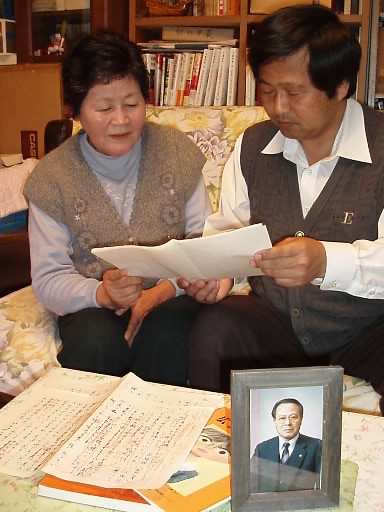Special Series: 60 years of RERF, Part II [3]
Jun. 30, 2010
Second-generation A-bomb survivors: Wavering feelings
by Masayoshi Ishikawa, Staff Writer
This feature series on the past and future of the Radiation Effects Research Foundation (RERF) originally began to appear in the Chugoku Shimbun in March 2007.
Families bound by fear of prejudice
Yayoi Kashiwabara, 52, an elementary school teacher in the city of Onomichi, Hiroshima Prefecture, cannot forget the words she heard when she lived in Osaka Prefecture as a junior college student. "Why do mandarin oranges from Hiroshima taste so good?" asked one of her male acquaintances. He was of the belief that the atomic bombing had affected the taste of oranges in the Seto Inland Sea region. The man, who struck Ms. Kashiwabara dumb with his question, caused further pain when he added, "I will never go to Hiroshima."
People fear radiation, an invisible substance. It was said in the aftermath of the atomic bombing that nothing would grow in Hiroshima for 75 years. This soon proved to be false, but prejudice against A-bomb survivors (hibakusha) and second-generation survivors, imprinted in the minds of people in many regions, still lingers.
On a local bus, some 30 years ago, Ikue Urabe, 72, a housewife in the city of Fukuyama, Hiroshima Prefecture, overheard a woman sitting in front of her say in a whisper, "You should not marry a second-generation A-bomb survivor." Naruhito, Ms. Urabe's husband, who died in September 2006 at the age of 75, experienced the atomic bombing as a student. The dormitory he was in at the time was approximately two kilometers from the hypocenter. Though the couple and their child were healthy at the time, she is saddened even now when she describes the incident. "I felt sorry for my husband and my son."
Research by the Radiation Effects Research Foundation (RERF) for almost 60 years, including that of the Atomic Bomb Casualty Commision (ABCC), the predecessor to RERF, has failed to shed light on the genetic effects of radiation on second-generation A-bomb survivors. With no definitive information available, ignorance and prejudice still vex A-bombed parents and their children.
At the end of February 2007, following a study on the health effects involving second-generation survivors, RERF concluded: "There is no significant difference between second-generation A-bomb survivors and the children of non-hibakusha." However, in preparing for this study, an incident occurred, back in 1997, which highlights the sensitivities still felt.
In order to send out a survey for the study, RERF obtained copies of slips attached to family registers from local governments, enabling the institute to confirm the addresses of the survey subjects. However, this move stoked concern among the second-generation survivors, as RERF carried out the procedure without announcement.
Although using family registers for research does not pose a legal problem, many second-generation survivors hope to keep their backgrounds hidden. Some parents, who fear prejudice against their children, have not told them about their experiences. What might happen if mail from RERF abruptly arrives for these people? Organizations of second-generation A-bomb survivors reacted against the institute's methods.
"RERF lacked understanding of the sensitivities of these people, and the scientists and bureaucrats were bloated with pride," said Akio Awa, 74, a resident of Saeki Ward, Hiroshima, and then RERF advisor and former chair of the Department of Genetics at RERF. Since that time, the institute has maintained an ethics committee, inviting third parties, including lawyers and researchers, to take part. The committee consults with organizations of second-generation survivors on how best to explain the progress of the survey and announce the results.
Masahiro Urabe, 48, the eldest son of Ms. Urabe and a senior member of a group of second-generation survivors in a teachers' union, has seen such interaction between the organizations and RERF. During consultations, he said he thought of his father, a hibakusha.
When his father was living, a friend from his school days came to ask if he would serve as a witness to verify the friend's experience of the atomic bombing. Such a witness was needed to obtain the Atomic Bomb Survivor's Certificate. The friend, sitting on the sofa across from his father in the living room, said, "Now that my daughter is married, I can apply for the certificate without worry."
Masahiro feels indignant at the reality that hibakusha hesitate to obtain the certificate, and that second- and third-generation survivors still face prejudice. At the same time, he wavers in consideration for the love of parents, who wish only for the peaceful lives of their children and grandchildren. "Is it better, in fact, to push the memory of their A-bomb experiences to the back of their minds?" he wondered.
(Originally published on March 24, 2007)








